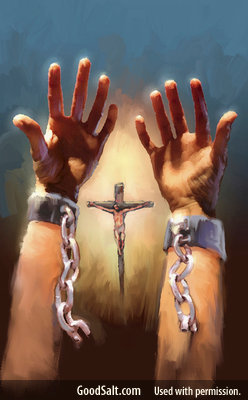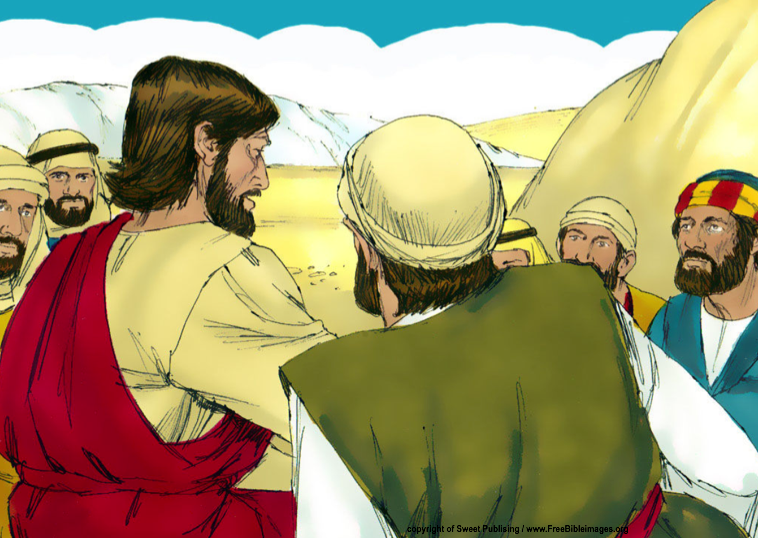“Therefore if the Son makes you free, you shall be free indeed.” John 8:36
The truth is many of us are not experiencing this kind of freedom from sin that we looked at in the first two articles. Why? What prevents us from overcoming our addictions?
SELF-SUFFICIENT PRIDE (John 8:33-36). This is what hindered Jesus’ audience. Keep in mind that Jesus’ audience was comprised of believers (“many believed in Him… those Jews who believed Him” – John 8:30b-31a) and unbelievers (“you do not believe Me… why do you not believe Me?” – John 8:44-45). When Christ spoke to the Jews who believed in Him (John 8:30-32), many of the unbelieving Jews listened in and were offended by Christ’s words. Then “they answered Him, ‘We are Abraham’s descendants, and have never been in bondage to anyone. How can You say, ‘You will be made free’?’ ” (John 8:33). Now this is a strange thing for them to say in light of the fact that they were currently in bondage to the Roman government. But that’s not what they mean. They are boasting of the fact that they are part of the Jewish ethnicity. They were convinced that God accepted them because they were descendants of Abraham.
This reminds me of when we lived in Dallas, Texas, in the 1980s and we would drive past Texas Stadium, where the Dallas Cowboys played. That was a unique stadium. It is not like the Kingdome or the Superdome and other great stadia where football is played, because it is not completely roofed over. It has a big hole in the roof right over the football field. Spectators are protected but the players are exposed to the elements. When I asked why I was told, “So God can watch His favorite team!” That is the way the Cowboys feel about themselves: “God’s Favorite Team!” That is what these Jews felt, too: “We are God’s favorite people; God’s chosen race.”
This is the real problem. This is what most often keeps people from coming to Christ and finding the path to freedom: They assume that because they are born into a religious or Christian family, they will go to heaven when they die. After all they live in a Christian nation or their parents were devoted Christians, so that must mean they are Christians and therefore they feel they are already free. And they ignore their hurt and heartache.
This reminds me that when people take their sin lightly, they often take their need for the Savior lightly as well. Evangelist Billy Graham once said, “To you, sin may be a small thing; to God it is a great and awful thing. It is the second largest thing in the world; only the love of God is greater.” (Billy Graham – Angels: God’s Secret Agents).
But Jesus cuts through all that self-sufficient pride and says, “Most assuredly, I say to you, whoever commits sin is a slave of sin.” (John 8:34). Like many people in the world, these Jews were in spiritual bondage to sin and they did not even know it. When I preached this message in the provincial jail in the Philippines, I took some thread and began to wrap it around my forefinger and middle finger.
As I did this, I said, “At first, sin seems harmless. We feel guilty, but we tell ourselves, ‘everybody else does it,’ and so we justify our sin and we do it again and again. Plus, it’s fun. Sin feels good at first, doesn’t it? I’m not just talking about drinking and sex, but other pleasures such as telling somebody off when he was wrong or indulging in gossip that ruins somebody’s reputation. Those too are pleasurable sins. But what happens when we keep repeating those same sins?” I wrapped more thread around my two fingers. “They form habits within us that finally become unbreakable. No matter how hard we try, we cannot stop the sin.” I then tried to separate my fingers without success. “You finally decide to quit but you cannot. This is what happened to these Jews.”
Maybe it has happened to you and you have lost all hope of overcoming the addiction that has mastered you. Jesus says, “And a slave does not abide in the house forever, but a son abides forever.” (John 8:35). These unbelieving Jews thought they were “sons” of God’s household forever because they were descendants of Abraham, but Jesus implies that they are only “a slave,” not a member of God’s household.
On the other hand, “a son,” a believer in Christ (cf. John 12:36), “abides forever” in God’s household and is set free from sin in his position (John 8:35b). “Therefore if the Son makes you free, you shall be free indeed.” (John 8:36). Only by believing or trusting in Christ alone as our Savior can Jesus set us free from the bondage of our sin. Christ is inviting these unbelievers to believe in Him so they can be set free from bondage to sin positionally through His atoning death on the cross! Once they have Christ in their lives through faith in Jesus alone, they can begin to experience freedom from slavery to sin experientially as they learn to “abide” in Christ’s word (cf. John 8:31-32).
When I said this at the jail, I cut the thread wrapped around my fingers. These Jews (and all unsaved people) must make a personal decision to believe or trust in Christ alone because only Christ can set them free from bondage to sin in their position. God does not have grandchildren, only children who receive Him by faith alone in Christ alone (John 1:12). When you believe in Jesus, He makes you what He is – a son who remains in the house of God forever. And in God’s family, you can enjoy unspeakable pleasures and privileges for eternity!
In January 1863 the Emancipation Proclamation was declared. This legal document said that all slaves were now free. But in the state of Texas, someone kept it a secret. They didn’t tell the people of Texas that they were free. So for a couple of years after the Emancipation Proclamation, they were still living like slaves. Texans were acting like slaves because no one had told them they were free. In fact, they were so glad that someone finally told them, they made that date a holiday, and African Americans celebrate Juneteenth every year. Thank God, someone told them! If no one had ever shared the good news, then they would have stayed in slavery much longer.
Over two thousand years ago, Jesus Christ, signed our Emancipation Proclamation. He declared that we are free positionally from bondage to sin, but Satan is trying to keep it a secret from us. He is trying to keep us from coming to the realization that we do not have to stay enslaved to sin. We do not have to say, “Yes, sir,” to the devil’s control of our lives any longer. We can take the freedom that Christ has provided for us at the cross, and act on it. We can start living in the freedom that we have because we have now been made free in Christ. That is who we are, but we must choose to live like it.
Prayer: My Lord and my God, I was once ignorant of my sin and my need for a Savior. Like Jesus’ unbelieving audience, I thought I would go to heaven because of my association with a Christian church and family. But neither my church nor my family could set me free from my bondage to sin. Only You could set me free from my sins positionally so I could become a member of Your household forever! Thank You for revealing this to me through Your Word and Your servants who shared it with me. Thank You that I am a permanent member of Your household by virtue of believing in Jesus alone, and now I have access to all the pleasures and privileges that come with it. Please help me abide in Christ’s Word so I may know the truth and be set free from the lies that enslave me to a lifestyle of sin. Please help me to see myself as You do – free from bondage to sin through Jesus’ atoning death – so I may act on this truth and experience the freedom it gives in my daily life. In Jesus’ name. Amen.




